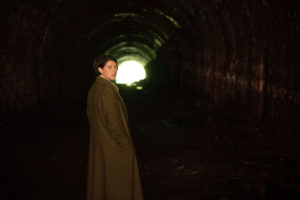“Man of God” is a play in no need of salvation.
The Geffen Playhouse’s production of “Man of God,” running until June 19, follows four girls on their Christian mission trip to Bangkok, Thailand, as they discover a camera hidden in the bathroom of their hotel. Through simple but effective staging, intentional dialogue and superb acting, “Man of God” sheds light on sexual assault and the female experience in an understandable yet subtle way.
The show begins by dropping the audience right into the midst of the action when one of the girls, Kyung-Hwa (Ji-Young Yoo), finds a tiny camera hidden behind the toilet in the bathroom of the girls’ hotel room. Horrified, the four girls join forces and try to find out who placed the camera without their knowledge. After much deliberation, they discover that the camera belongs to Pastor (Albert Park), who organized the mission trip and chaperoned the girls.
[Related: Alumnus’s show celebrates Auntie Sewing Squad’s work to ease effects of COVID-19]
In setting up the exposition, the small details of the hotel room – such as fake dust on the air vent and questionable stains on the walls – fully submerge the audience into the world of the play. The meticulous design of the room further adds to the intimate feel of the story and invites audience members to become flies on the wall, watching the girls as they come to terms with their privacy being invaded.
Because the storyline tackles a serious topic, the playful dialogue effectively lightens the mood and adds an eerie undertone to the perturbing events of the production. While the girls work through their conflicting feelings about finding out someone they trust has betrayed them, they utilize refreshingly realistic teen-esque language and slang to emphasize their age and build credibility in the world of the play.
As the show progresses, the audience gets a closer look into the minds of three of the girls via small dreamlike interludes where they comedically confront and battle the pastor. For instance, Samantha (Shirley Chen) engages in an over-exaggerated sword fight with the pastor, highlighting her simple approach to anger and conflict resolution. Contrastingly, Jen (Emma Galbraith) imagines a more psychologically manipulative interlude resembling a film noir confrontation. By including these sections, the increasingly emotional story is thankfully broken up by successful spurts of comedic relief.
Not only do these dream scenes provide more insight into the ways the girls process anger and betrayal, but they also cleverly give the audience different characterizations of the pastor before seeing him in person. This excellent plot device makes his final introduction at the end even more haunting because the audience learns of his actions before he is able to make any type of impression on it.
[Related: Theater review: ‘Who’s Afraid of Virginia Woolf?’ leaves audience captivated by twister marriage]
Along with certain plot devices adding nuance to the play, the high-quality acting portrayed in both dialogue and silence remains consistent throughout the production. The character Mimi (Erin Rae Li), the rebellious and hot-headed member of the ensemble, has dialogue riddled with curse words, and in the final scene, she stomps around the stage while the rest of the cast silently pack up their things. This consistency makes the characters seem like real people with predictable behavior, furthering the believability and subsequent troublesome nature of the overall story.
In the exploration of each character and their varied experience with sexual assault, the production also draws attention to the issue in a tangible way and directly shows the difficult decisions assault victims face in the aftermath of their experiences. Though the play utilizes simple dialogue and contains no intermission, this allows the profound topics space to be explored in a powerful way. Very little in the plot is ever stated explicitly, but through small movements or looks by the actors, the audience is given the tools it needs to clearly understand the story.
Ultimately, “Man of God” shows what happens when faith is left in the wrong hands.





Comments are closed.